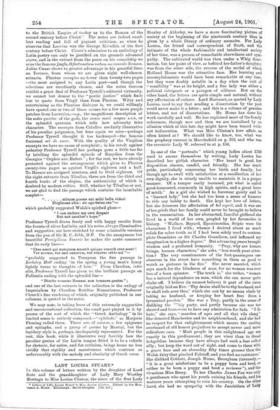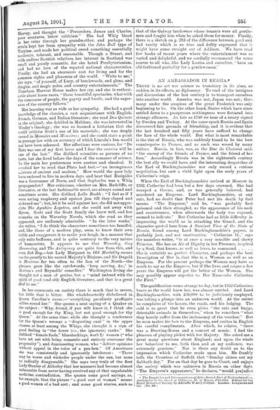LADY LOUISA STUART.* is; this volume' of letters written by
the daughter of Lord Bute - and the granddaughter of Lady Mary Wortley Montagu to Miss Louisa Clinton, the niece of the first Lady
• Letters of Lally Louisa Stuart to Miss Louisa Clinton. Edited ty the Hon. 1Mues A. Home. Edinburgh: David Douglas. [2ls. not.]
Stanley of Alderley, we have a more fascinating picture of society at the beginning of the nineteenth century than is given by a whole library of ordinary memoirs. For Lady Louisa, the friend and correspondent of Scott, and the intimate of the whole fashionable and intellectual society of her time, was a person of remarkable shrewdness and sym. pathy. The cultivated world was then under a Whig domi- nation, but her point of view, as befitted her father's daughter, was from the other side, the reverse of the medal of which Holland House was the attractive face. Her learning and accomplishments would have been remarkable at any time but they were doubly notable in a day when the cult of
sensibility " was at its height, and a fine lady was either a political intrigante or a paragon of silliness. But on the other hand, the letters are quite simple and natural, without
any affectation of culture. Lord Harcourt, as quoted by Lady Louisa, used to say that sending a dissertation by the post could never make it a letter ; and this is a volume of genuine letters, and not of dissertations. Mr. Home has done his work carefully and well. He has explained most of the family references, though now and then we are tantalised by an allusion which at this late day might have been traced with- out indiscretion. What was Miss Clinton's love affair, so often hinted at? We should like to know, too, what was the prophecy current in Macclesfield on p. 102, and who was the eccentric Lady W. referred to at p. 156.
In one of the " portraits " which young ladies about 1780 used to amuse themselves by writing, Lady Louisa has described her girlish character. " Her heart is good, her disposition sincere, candid, and friendly. She has much pride, particularly concerning her birth and family, but though apt to swell with satisfaction at a recollection of her own dignity, she is utterly unable to maintain it in a proper manner. Of a temper easily incensed, yet what is called good-humoured, commonly in high spirits, and a great lover of mirth." As a girl she wished to forswear gaiety and be a "learned lady," but she had too keen a sense of humour to ride any hobby to death. She kept her love of letters, but she forswore the affectation of bel esprit, and it was one of her griefs that her family could never be brought to believe in the renunciation. In her abstracted, fanciful girlhood she lived in a world of her own, peopled by her favourites in history. " Wallace, Bayard, Epaminondas, Scipio were the characters I lived with ; whence I derived about as much relish for sober truth as if I had been solely used to contem- plate Orondates or Sir Charles Grandison, and inflamed my imagination in a higher degree." But advancing years brought wisdom and a profound humanity. "Pray, why are human beings, human characters," she asks, "less worth your Eaten. tion ? The very countenances of the foot-passengers one observes in the street have something in them as good to watch as pictures in the fire." She never married, which says much for the blindness of man, for no woman was ever less of a born spinster. "The truth is," she writes, ".woman has a natural dependence on man, which she can never quite shake off. I believe (in earnest believe) it part of the curse originally laid on Eve: Thy desire shall be to thy husband, and he shall rule over thee,' which she can by no means elude by taking no husband, or keeping her heart free from a tyrannical passion." She was a Tory, partly in the sense of disliking the vihig party, and partly because she was too shrewd and humorous to have any admiration for fads. "I do hate," she says, "marches of ages and all that vile slang." She detested Manchester and its neighbourhood, and she had no respect for that enlightenment which means the casting overboard of old honest prejudices to accept newer and more ridiculous ones. " Most people in this' enlightened age are exactly in this predicament; they are wiser than to dread hobgoblins because they have always had such a fear called silly; but keep the word out of sight, and come to them with. a grave face and an absurdity fifty times grosser than the Welsh fairy that pinched Falstaff, and you find no resistance." She disliked Cobbett, Joseph Hume, Brougham (intensely,- " it is a great misfortune to be a puppy born and bred, or rather to be born a puppy and bred a reviewer "), and the vivacious Miss Berry. To her Charles James Fox was only a gentleman who spent his youth ruining his friends, and his matures years attempting to ruin his country. On the other hand, she had no sympathy with the Jacobitism of Lady
fey, and thought the Pretenders, James and Charles, poor creatures, below criticism." She had Whig blood in her. veins through her grandmother, and perhaps the strain kept her from sympathy with the John Bull type of Toryism, and made her political creed something essentially moderate, tolerant, and reasonable. Though a Stuart, and with endless Scottish relatives, her interest in Scotland was small and purely romantic, for she hated Presbyterianism, and had no love of the reputed national characteristics. Finally, she had an enormous zest for living and for the commix sights and pleasures of the world. " Write to me," she says, "of yourself, of Lucy, of beechwoods, and glens, and dingles, and magic poles, and country entertainments." The Nuneham Harvest Home makes her cry, and she is enthusi- astic about horse-races, "those beautiful spectacles, what with the concourse of people, the gayety and bustle, and the eager- ness of the country fellows." -
Her learning was as wide as her sympathy. She had, a good knowledge of the classics, a vast acquaintance with English, French, German, and Italian literature; she read Don Quixote in the original; she dabbled in Malthus; she was interested in Wesley's theology; she was so learned a historian that she could criticise Scott's use of his materials ; she was deeply versed in Memoirs and Memoires ; and she could state a point in peerage law with an accuracy of Which Lincoln's Inn would not have been ashamed. Her affections were curious, for "De Retz was one of my first loves and I fear the vaurien will be one of the last.' She disliked scientists as persons of no taste, but she lived befpre the days of the romance of science. In the main her preferences were austere and classical. It revelled her to read that Plato had tact,—" an incongruous wixture of ancient and modern." How would the poor lady have endured to live in modern days and hear that Euripides was a forerunner of Ibsen, and that Sophocles was a Whig propagandist? Her criticisms, whether on Mrs. Radcliffe, or Cervantes, or the last fashionable novel, are always sound and sometimes acute. She disliked Lana Rookh : "I feel as if I were eating raspberry and apricot jam till they cloyed and sickened me"; but, let it be said against her, she did not appre- ciate The Ayrshire Legatees, and she could not away with Byron. Scott and the Scott family she brew well, and her remarks on the Waverley Novels, which she read as they appeared, are uniformly admirable. " In the later works," she writes, "I do think the characters sometimes too fanciful, and, like those of a modern play, seem to know their own foible and exaggerate, it to make you laugh, in a manner that only suits buffoons, and is quite contrary to the very nature of hutnourists. It appears to me that Waverley, Guy Mannering, and The Antiquary are quite free from this, and even Rob Roy,—but Lady Margaret in Old Mortality recurs too frequently to his sacred Majesty's Disjune, and Sir Dugald in Montrose far too often to the lion of the North—the phrases grow like the catchwords, keep moving, arc.: in Morton's and Reynolds' comedies." Washington Irving she thought not a man of genius, but a " mind imbued with the spirit of good (and old) English literature, and that is a great deal to me."
In her comments on society there is much that is severe, but little that is bitter. She wholeheartedly disbelieved in Queen Caroline's cause,—" everything peculiarly profligate rallies round her." She quoteS a neat saying of a Quaker On the subject : " Why, friend, if you wilt know it, think she is good enough for thy King, but not good enough for thy Queen." At the same time.-while she thought a tenderness for the "Queen's wrongs a " disgusting cant " in the upper classes, at least among the Whigs, she thought it a sign of good feeling in "the lower (i.e., the ignorant) ranks." She disliked " female fools," bluestockings, work 17 women (" who have set out with being romantic and entirely overcome the Propensity "), and domineering women, who " deliver opinions without appeal in the voice of a pea-hen." Of Americans
she was consistently and ignorantly intolerant: There may be worse and wickeder people under the sun, but none so radically disagreeable." She says very truly of the first Lady Stanley of Alderley that her manners had become almost unbearable from never having received any of that unpalatable medicine, contradiction. She quotes Some good sayings, as, for example, that the phrase " a good sort of woman " means
good woman of a bad sort ; and some good stories, such as that of the Galway landowner whose tenants were all gentle- men and fought him when he asked them for money. Finally, there is a sketch on p. 213 of the difference between good and bad vanity which is so true and deftly expressed that it might have come straight out of Addison. We have read. few books of recent years where the entertainment was so varied and delightful, and we cordially recommend the same course to all who, like Lady Louisa and ourselves, " have an old-fashioned partiality for a gentlewoman."



































 Previous page
Previous page